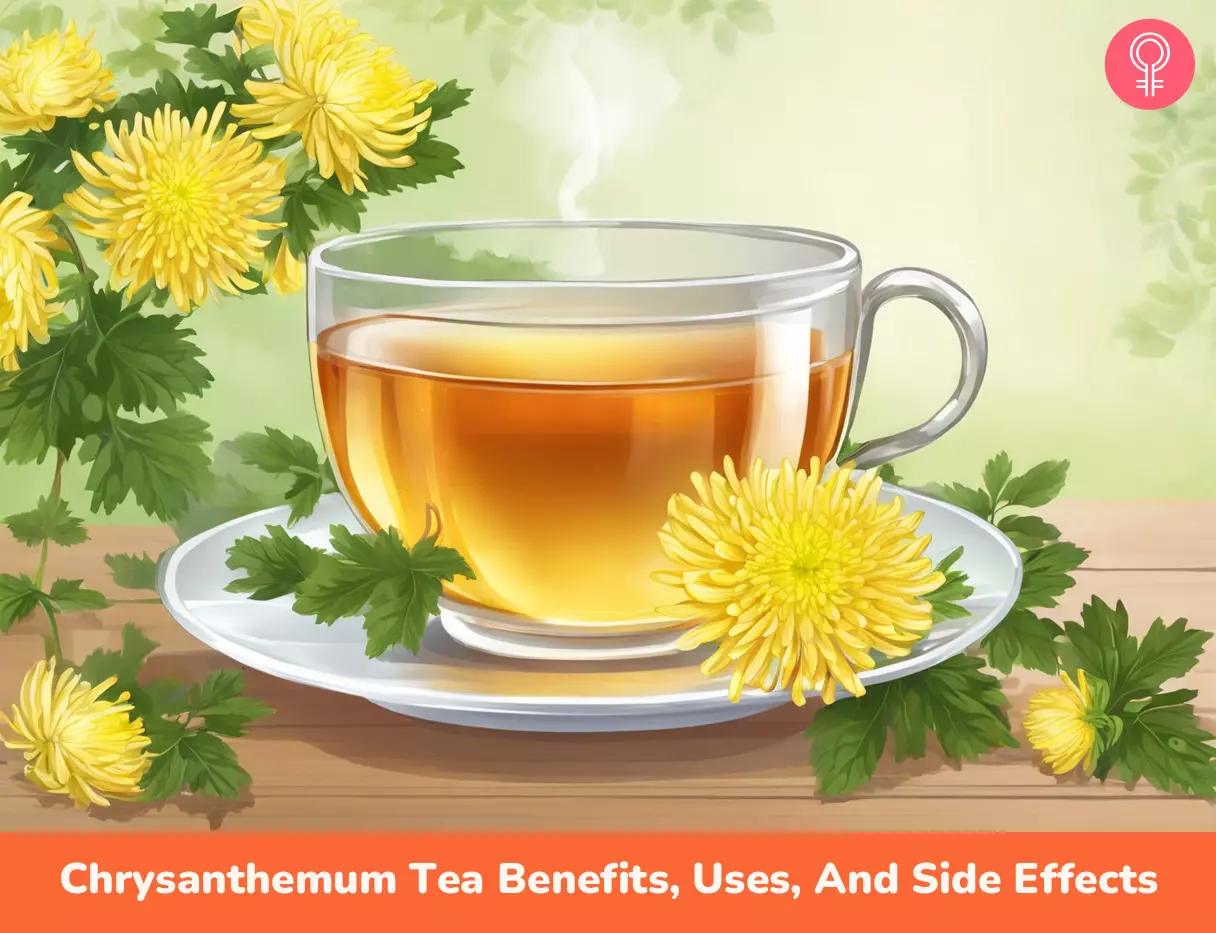This article explores the chrysanthemum tea benefits, its preparation, and its possible side effects. Take a look.
What Is Chrysanthemum Tea?
Chrysanthemums are flowers native to China and were first used as table decorations. However, they later gained popularity as a culinary herb in households. They are also used for pest control. More than 100 varieties are cultivated across the world. But the cultivars (cultivated varieties) with small yellow flowers and purple flowers are widely used for preparing tea. What Are Its Benefits? May help improve mental well-being, maintain heart health, fight inflammation, and promote better brain function. Who Can Use It? Safe for consumption by all in moderate quantities. How Often? Alternate days or twice a week. Caution May cause irritation and rashes in people allergic to the flower or pollen.
Chrysanthemum flower tea is a concoction made from dried petals. Its taste is subtle, and the tea doesn’t leave any heavy or flowery flavor behind. Instead, it has a buttery undertone that tastes like honeysuckle or honey. Drinking chrysanthemum tea is a popular part of tea culture in China, as it not only is a delicious and caffeine-free floral tea but also is also known for its natural remedies that promote wellness, stress relief, and relaxation while also boosting the immune system, aiding digestion, and providing hydration. It is a valued component of traditional Chinese medicine and a popular choice for a tea ceremony. The tea is available in various other types. Each type has its own unique attributes. Learn more below.
Types Of Chrysanthemum Tea
The most famous varieties of chrysanthemum tea originate from four regions of China after which they are named. They are as follows: Chrysanthemums are rich in several nutrients. In the next section, we take you through the nutritional profile of chrysanthemum flowers.
Nutritional Profile Of Chrysanthemum Flower
100 g of chrysanthemums contain (1): Chrysanthemums also contain minerals like copper, magnesium, sodium, potassium, manganese, calcium, iron, zinc, and phosphorus. Besides, they contain flavonoidsi A group of natural substances found in many fruits and vegetables with anti-inflammatory and disease-fighting properties. that are essential antioxidants. Chrysanthemums are low in fat and devoid of sugar, making their tea a healthy option. So, it is no surprise that this herbal tea is frequently featured in several traditional medicines. What are its health benefits? Scroll down to know more.
7 Potential Health Benefits Of Chrysanthemum Tea
Chrysanthemums release their nutrients when boiled in water. However, the nutrients are properly delivered to the body when the concoction is not boiled for too long. Chrysanthemum tea, when consumed fresh, may offer the following benefits.
- May Help Manage Anxiety Chrysanthemums contain chlorogenic acid (an antioxidant), which relieves oxidative stress on the brain. Stress is one of the major reasons for anxiety. It also may cause headaches and irritability (2). A study on mice suggests that chlorogenic acid has anxiolytic (anxiety-reducing) effects on the nerves (3). However, more extensive research and human trials are warranted to draw more concrete conclusions.
- May Help Maintain Cardiovascular Health As stated above, 100g of chrysanthemums contains 567 mg of potassium. Studies suggest that increased potassium intake may lower blood pressure in people with hypertensioni A condition characterized by high blood pressure, where the force of the blood pushing against the artery walls is too high. . Besides, adequate potassium intake was found to reduce the risk of stroke by 24%(4). Hence, drinking chrysanthemum tea may help manage hypertension and reduce the risk of heart disease.
- Has Anti-Inflammatory Properties Studies suggest chrysanthemum flowers contain flavonoids and phenolic acids, which show anti-inflammatory and antioxidant behavior (5). Besides, these flowers contain vitamin C, which also has anti-inflammatory properties and helps improve immunity. Moreover, patients given regular doses of vitamin C foods had shown fewer signs of inflammatory responses, including hypertension and rashes (6), (7).
- May Help Reduce The Risk Of Cancer Chrysanthemums have been shown to have anti-inflammatory and anticancer properties. Studies suggest that chrysanthemum extracts may protect against colon and prostate cancer by inducing the death of tumor cells (apoptosis) (8),(9). Besides, chrysanthemum flowers contain vitamin C, which acts as an antioxidant. Antioxidants fight and inactivate free radicals, which are one of the major reasons for the development of cancers (7),(10).
- Helps Promote Overall Health Vitamin A is available to the body as retinol and carotenoids, which help improve overall health.
Carotenoids are plant pigments available in most fruits and vegetables. They are digested by the body and then converted into 500 types of vitamin A. Beta-carotene (an antioxidant) is one of them (11). Retinoids are compounds present in dairy, meat, fish, and poultry products. They help produce the pigments in the retina of the eye (11).
Vitamin A in chrysanthemum tea promotes skin and hair health. It also promotes eyesight, especially in low light. Besides, vitamin A also helps maintain the strength of bones and soft tissues and plays a key role in healthy pregnancy and breastfeeding. Retinol has been shown to help delay skin aging (12). In addition, its antioxidant properties may help combat UV-induced skin aging. 6. May Help Promote Neurological Functions Chrysanthemum tea contains vitamin B6 and folate. Vitamin B6 helps maintain brain and cognitive functions and promotes the production of red blood cells. It also plays a major role in regulating brain glucose. Higher glucose levels in the brain tend to cause inflammation, impair brain and cognitive functions (13), (14). The body needs folate to make DNA and other genetic material, and its deficiency may impair cognitive functions and cause early-onset dementiai A syndrome of related symptoms that results in impaired thinking, memory, language, and daily functioning. . Folate is also essential in every step of fetal formation. Besides, it provides the much-needed strength for both the baby and the mother (15). 7. May Help Reduce PMS Symptoms Vitamin B6 and magnesium in chrysanthemums may help reduce mood swings and other symptoms of premenstrual syndrome (PMS). Moreover, the combination of vitamin B6 and magnesium was found to be more effective in relieving PMS symptoms than magnesium alone (16). Another study also suggests that supplementing magnesium may be an effective option to treat the painful symptoms of PMS (17). Note: All these benefits are subject to the long-term consumption of chrysanthemum tea. Brewing herbal chrysanthemum tea is simple and does not take more than 10 minutes. Let’s understand how to prepare it.
How To Make Chrysanthemum Tea At Home
What You Need
2 teaspoons of dried chrysanthemum leaves A straining cloth (to be used as a tea bag) or a filter 3 cups of water Honey or natural sweetener to taste (optional)
How To Prepare
Possible Side Effects And Allergies Of Chrysanthemum Tea
Daily intake of chrysanthemum tea is not advised as it has a cooling effect on the body. Of course, even though this can be seen as a positive, too much of anything can prove to be harmful. In addition, people allergic to ragweed may experience allergic reactions to chrysanthemum flowers too, like skin irritation, itchiness, rashes, redness, or itching upon drinking this tea. One study reported these allergies in workers of greenhouses growing chrysanthemum plants (18). Consult a physician immediately if any of these symptoms arise. Even though there aren’t enough scientific studies to prove this, excess intake of chrysanthemum tea may also increase your sensitivity to sunlight and cause sunburns. Hence, drinking it on alternate days or once every three days is advised. Does chrysanthemum tea make you sleepy? Yes, chrysanthemum tea can make you feel sleepy as it exhibits sedative effects. It has a relaxing effect on the body and can promote quality sleep. Is chamomile the same as a chrysanthemum? No, chamomile and chrysanthemum are not the same. Though they both come from the same Asteraceae family, they differ in taste. Chamomile tea has a sweet, apple-like flavor and a mild floral smell, while chrysanthemum tea has a lighter, slightly herbal taste with a hint of bitterness. Here, you can also read about chamomile tea benefits, which will determine the proper distinction between the two, enabling you to make an informed choice and enhancing your tea experience. Does chrysanthemum tea have caffeine? It is a completely caffeine-free herbal tea. The Chrysanthemum tea itself does not contain any caffeine, and its dried flowers also do not contain any caffeine. How much chrysanthemum tea should you drink per day? Usually, 1-2 cups of Chrysanthemum tea is safe for daily consumption. We recommend consulting a healthcare professional before adding this tea to the diet in case of pregnant and breastfeeding women. While the drink has several significant health benefits, drinking more than the prescribed amount may cause health hazards. Is chrysanthemum good for the kidney? Chrysanthemum tea has been traditionally known as a medicinal herb for well-being. However, there is no concrete study yet, which can prove its potential benefits for the kidney. It contains antioxidants and anti-inflammatory substances, which help to reduce stress and extract extra fluid from the body, thus benefiting the kidney. Does chrysanthemum reduce cholesterol? A study published by the Journal of Agricultural and Food Chemistry says that the chrysanthemum extracts contain antioxidants. They have cholesterol-lowering properties in it. Another paper in the Journal of Ethnopharmacology highlighted the cholesterol-lowering characteristics of chlorogenic acid found in the extracts of chrysanthemum flowers. However, more conclusive research is yet to be done to solidify the findings. Can you drink chrysanthemum at night? It is safe to drink Chrysanthemum tea at night before you go to bed. It makes the body relaxed and stimulates sleep quality. Can chrysanthemum tea be used as a natural remedy for colds and flu? Chrysanthemum tea can be a beneficial remedy for colds and flu. It has anti-inflammatory properties, which may protect against sore throat, congestion, and cough. Is chrysanthemum tea good for digestion and bloating? Chrysanthemum tea may benefit the digestive system with its wholesome characteristics as a health drink. However, we can not be certain about its benefits toward achieving better digestive health due to a lack of conclusive evidence. We recommend consulting a doctor in case of chronic bloating or other severe digestive issues.
Illustration: Chrysanthemum Tea Benefits Uses And Side Effects
Learn about the top 9 advantages of chrysanthemum tea. Discover how this delicious tea can benefit your entire health and well-being by watching the video below.











